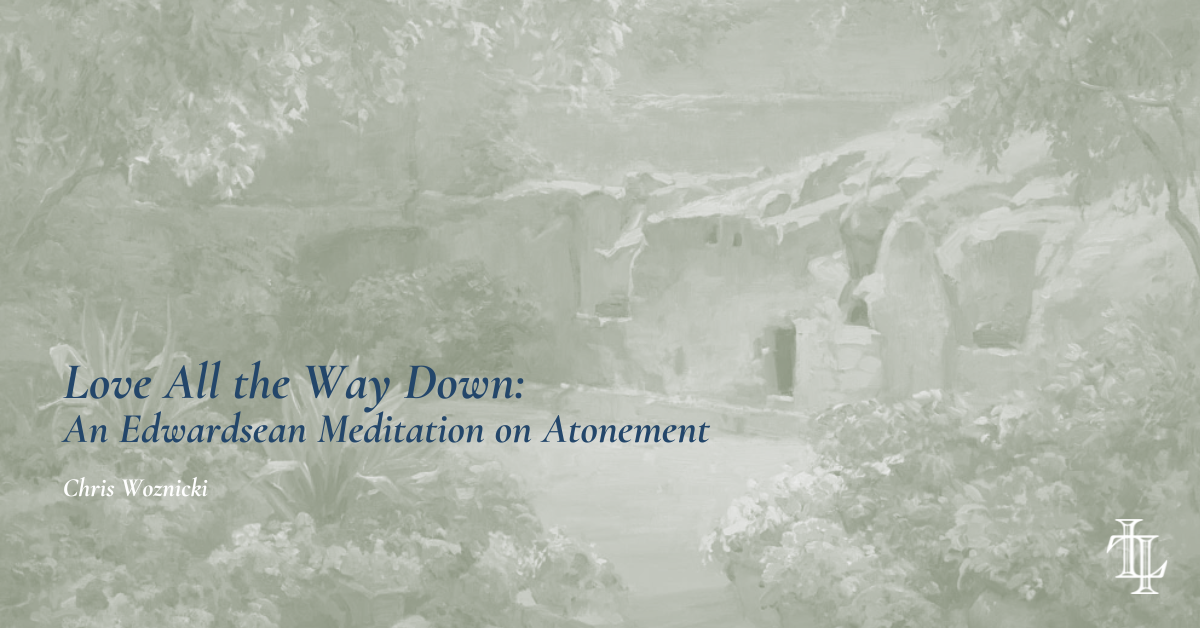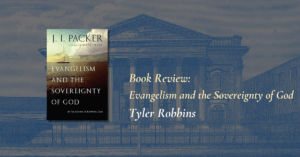This Good Friday pastors around the world will stand up before their congregations and declare the glorious truth: “For God so loved the world, that he gave his only Son, that whoever believes in him should not perish but have eternal life.” (John 3:16, CSB) They will declare this truth so that their flock may stand in awe and wonder at the depth of God’s love for them. They will preach this message clearly so that some may come to believe this good news, repent, and be saved. They might even elaborate upon this truth by emphasizing Christ’s love for his bride (Eph. 5:25) or the Son of God’s love for “me” (Gal. 2:20b). These pastors will rightly proclaim the cross as the climax of a love story spanning millennia. Yet the story of the cross is more than just a love story between the God who saves and a people in need of a savior. Jonathan Edwards helps us to see how the story of Christ’s atoning work is story of love all the way down: love for us and love between the Father and the Son.
Christ Makes Atonement Because He Loves the Father
When we talk about atonement we rightly emphasize how much God loves those whom he has died for (Rom 5:8) and made propitiation for (1 John 4:9-10). In the atonement Christ undergoes the penal consequences of sin. While we rightly emphasize that the atonement satisfies the justice of God, Edwards reminds us that Christ’s love for God is the reason God accepts his atonement in the first place. Atonement is a work of Christ’s love for the Father. Specifically, God the Father sees Christ’s atoning work as meritorious and effective because of Christ’s love and regard for the Father. “Christ’s act of offering up himself a sacrifice was an exercise so great love to God, so it was a transcendently holy act.”1WJE 14:450. It “not only testified his love to men, but an infinite regard to the glory of God, and showed his infinite love to God.”2WJE 14:450. Christ’s redemptive work was acceptable to God because it was an act of love to God.
The death of Christ merited positive blessings by virtue of the holiness, or which is the same thing, the righteousness of that act. Now the holiness of it consisted in its being an expression of infinite love or regard to God.3WJE 13:498. (Misc. 452.)
Obedience carried out apart from love would not have satisfied the demands of justice. Christ’s love is the foundation of satisfaction. We can rightly stress that Christ’s righteousness is his love for the Father. Righteousness is more than—though certainly not less than—the keeping of God’s commands. In a world that seems allergic to righteousness because it is a “cold,” “impersonal,” legal category Edwards’s thought highlights the fact that righteousness is a relational concept. Just as Christ’s righteousness is rooted in love, our call to righteousness is also rooted in relational—even covenantal—categories.
The Father Accepts Christ’s Atonement Because He Loves the Son
But it is not only the Son’s love that is exalted in the atonement: The Father accepts the Son’s sacrifice because of his love for the Son. Edwards explains,
The divine excellency of Christ and the love of the Father to him is the life and soul of all that Christ did and suffered in the work of redemption. Indeed, men have their sins pardoned for the sake of the divine excellency of Jesus Christ…and have a title to eternal life for the sake of Christ, and because the Father infinitely loves him.”4WJE 13:524. (Misc. 483.)
The Father gladly accepts the Son’s work on behalf of sinners because of his great love for the Son. Christ’s work is an acceptable substitute not only because it objectively meets the demands we should have met but because of the Father’s love for him. Atonement rooted in the Father’s love is far from the caricature of an angry God thirsting for satisfaction. While a vision of the Father seething in anger needing to find an object to lash out on in wrath might have gotten hold of certain segments of society Edwards’s view undermines such wrongheaded imagery. Atonement is not made out of anger, rather, it is made in love.
The Father Loves the Redeemed Because He loves the Son Who Loves His Beloved
Finally, love explains how the Father perceives the elect in Christ. The Father loves the elect because they are loved by the Christ.5WJE 13:524. (Misc. 483.) The elect are united to Christ because the love Christ has for them. It is this love that “is sufficient thus to unite the lover with the beloved.”6WJE 13:525. (Misc. 483.) Edwards uses vivid imagery to describe the sort of love Christ has for those whom he gives his life for. Christ will withhold none of himself from his beloved.
- “Christ won’t descend lower to admit us to the kisses of his mouth, who are not worthy to kiss his feet, than he did to wash our feet.”
- “Christ will surely give himself as much to his saints as he has given himself for them.”
- “He whose arms were expanded to suffer, to be nailed to the cross, will doubtless be opened as wide to embrace those from whom he suffered. He whose sides, whose vitals, whose heart, was opened to the spear of his enemies to their malice and cruelty, and to let out his blood, will doubtless be opened to admit the love of his saints.”7WJE 18:370. (Misc. 741.)
Some of the language Edwards uses might make readers a bit uncomfortable because of how passionate it is or because of how graphic it seems. But the vivid nature of this imagery makes Edward’s position clear: Ultimately, for Edwards, Christ’s sacrifice is atoning because of the Father’s love for Christ, Christ’s love for the Father, and their love for the elect. As believers we should never tire of meditating on how we are drawn into the loving relationship between the Father and the Son.
Preach Atonement as God’s Love Story
Edwards would have never denied the importance of preaching atonement as an act of God’s justice. Upon the cross Christ paid the wages of sin for us because of his great love for us. But the cross is more than just the story of God’s love for us. It is the story of the Father’s love for the Son and the Son’s love for the Father. This Friday I will join a multitude of pastors who have the privilege and responsibility to pass on the message of first importance: That Christ died for our sins in accordance with the scriptures. While there will certainly be a gravity to what I preach—the meeting of God’s justice is a serious thing—it will not end there. I will certainly proclaim it as the climax of God’s love for us. But if I fail to explain that God’s love is so much bigger than just love for us then I will do my congregation a disservice. They will think that the cross is all about them. They will think that God’s story revolves around them. God’s redemptive history is not less than that it’s actually so much bigger than that. I will remind them that God is the main character in God’s story. I will exhort them by reminding them that we can’t grasp the fullness of the gospel without understanding God’s Trinitarian love. The Father loves the Son, the Son loves the Father, the Spirit is the bond of love between the Father and Son. Stressing this will help them discern when bad trinitarian theology pits the Father against the Son on the cross. But more importantly, reminding them of the trinitarian love ad intra reminds them that God’s love doesn’t come into being or get “activated” because he needs to redeem us. Rather, it reminds that that God is love. He always has been.
Author
-

Christopher Woznicki (PhD, Fuller Theological Seminary) teaches systematic theology at Fuller Seminary and Ridely College. He is a Research Fellow at the Jonathan Edwards Center at Gateway Seminary. He is the founding contributor of Theology News, serves with YoungLife, and serves as a Senior Editor for Hanover Press. He is married to Amelia, who is on staff with Young Life. They have two children.
View all posts




